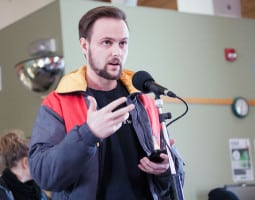NICHOLAS MARLATTE

Jon Herriot, the USSU representative for the College of Medicine, voiced concerns at the Jan. 15 town hall meeting.
With budget cuts becoming a reality for the University of Saskatchewan, students need to be consulted now more than ever.
As a result of the provincial government announcing it was reducing future funding increases to the U of S, we have been faced with the need to restructure and cut many programs to ensure financial sustainability.
This process has taken the form of TransformUS, where programs and services have been prioritized according to an assessment of their value. It has been increasingly evident that the TransformUS process is being rushed through at the expense of students, faculty members and support services workers without their concerns being properly considered.
Many students have raised issue with programs in lower quintiles being there due to incomplete evaluations. Other programs are obviously inadequately represented given the minimal financial impact of interdependent programs or the unique value certain programs provide to the school’s community.
This problem is one which the provost of the planning committee, Brett Fairbairn — also involved in the implementation of TransformUS — illuminated at the final town hall meeting on Jan. 15th, 2014. These issues require further analysis and evaluation during the planning phase.
Though it should be expected that the analysis and planning phase will involve further research to evaluate programs, it is difficult for students and faculty to formulate accurate concerns when our own phase of consultation will already be completed by time the program reaches this point.
These planning phases are further exasperated by the sheer speed at which the consultation period itself has taken place.
The release of the TransformUS reports and the start of the consultation period coincided with final exams and continued through the winter holidays — with consultations planned to end after less than two months.
This timeline has made it very difficult for students and faculty to formulate a response given the other priorities in these busy times of the year.
During this consultation period, the administration has held three town hall meetings to meet with students and gather their feedback.
However, scheduling for these events shows a lack of concern for the busy timetables of students and lack of accommodation in aiding them to provide input.
All of the meetings took place while many students and faculty have classes and were offered with little variation in timing for different schedules. For example, the last two meetings were planned for the same times over consecutive weeks.
Given the poor turnout to the town hall events, it’s obvious that the administration has failed to engage students. But this doesn’t seem to be a problem to them.
At the final student town hall meeting, President Ilene Busch-Vishniac explained that administration had put the effort into reaching out to students using a number of forms of media. She argued that lack of the engagement was likely a result of students realizing their programs will not be affected while they’re enrolled and they are likely busy with classes and research.
Given administration’s recognition that students who would want to take part are preoccupied during their events, it calls into question whether or not they are actively trying to involve students.
If we were genuinely being consulted, wouldn’t the administration try to accommodate the schedules that we as students all share and give us more time to respond?
If students are too busy, then surely our interests can be upheld by our elected representatives. However, when pressed as to why student organizations created specifically to represent the student population were not met with, Busch-Vishniac argued that, because it is a financial issue, TransformUS is not under the authority of student representatives.
Do we even have a stake in this university or has this process simply been a façade?
The administration’s choice to not include elected student representatives from important university developments have made students feel distant from their own campus.
This alienation from the university has created a culture which allows for representatives from the College of Arts and Science to be absent from cross-campus deliberations on TransformUS. For student leaders to publicly share sentiments of only being concerned about their own programs, despite being elected representatives of a wide range of departments, is also problematic.
Administrators have continually reassured students that they will be able to complete their programs before changes have been made. This has been useful to calm a largely uninformed student body, but it also encourages students to remain disengaged in TransformUS.
Implicit within the language of TransformUS is the recognition that we perceive ourselves as members of the university. We as students, faculty, support services workers and administrators see ourselves as part of a larger community that values education and the advancement of knowledge.
We recognize that circumstances largely beyond our authority have necessitated that we change the way our university functions. Yet the process we have been subjected to expresses a divisiveness that has alienated one of the university’s largest stakeholders: the students
If administrators are genuine about aiming for the future success of our university, they need to recognize that the cultivation of community on campus is a vital priority. It’s not about enrollment, but a mutual respect for our shared experiences as members of this university.
For this to happen meaningfully, students must be involved in the financial decisions that will lay the framework for our campus.
If we are going to transform ourselves as a university and community, then students cannot be left out of the decisions. This is our university too.
—
Photo: Andrew Mareschal
Leave a Reply